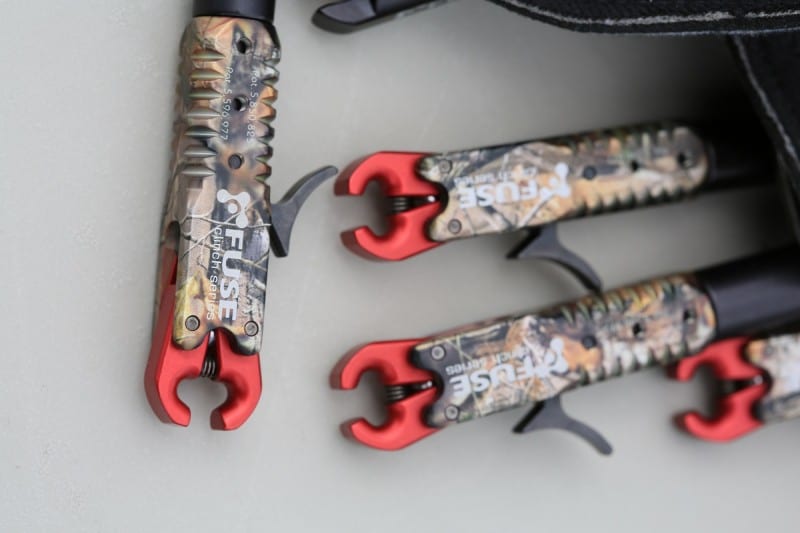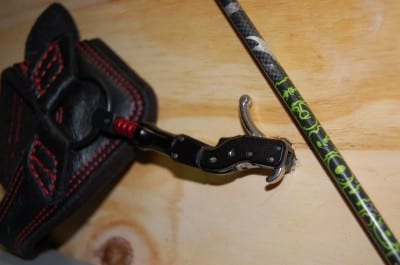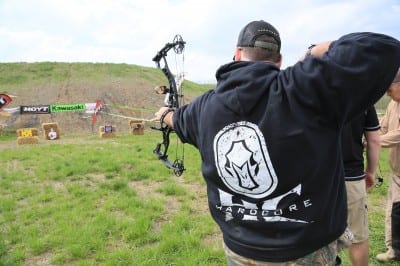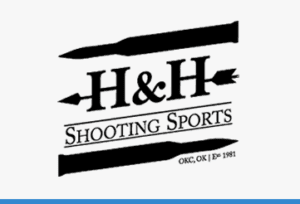 There are a lot of quality releases on the market. Find the one that fits your style and budget. Image by Alfonse Palaima.
There are a lot of quality releases on the market. Find the one that fits your style and budget. Image by Alfonse Palaima.
Modern archery hunters have learned to use a release aid to ensure accuracy and increase the enjoyment of not only hunting, but shooting as well. As with any other part of the sport, there are many different releases to choose from and a wide range of price points. Selecting the right release is a matter of seeing what’s out there and picking the release that is right for you.
Selecting the best release for you
There are several different styles of releases, said Steve Tentler, owner of Tru-Fire, a Wisconsin-based archery accessories company.
“For many people the selection process is based on cost. If cost isn’t an issue then the end user needs to confirm whether or not they want a handheld or wrist model,” he said.
Handheld releases are great for the person who tree stand hunts since you can usually leave the release attached to the loop of the bow. The downside, Tentler said, is the possibility of losing the release since it’s not attached to the wrist. For spot and stalk situations, a hand held release can sometimes be a hindrance especially if it’s in your hand and at the same time you are trying to make your way up or down a hill grabbing whatever is close to “keep you vertical,” Tentler said.
“In my opinion handheld releases are slightly more difficult to draw a bow back verses a wrist model,” he said. “This becomes even more obvious the more clothes you have on, especially in the later seasons. Wrist models, which are the most popular, are a great option since the bow’s draw weight is distributed around the wrist which seems to make the draw cycle have less effort than a hand held.”

The swept-back trigger design of the Tru-Fire Hardcore helps the archer to not “punch” the release. Image by Derrek Sigler.
What’s the difference between a $35 release and a $100 release?
According to Tentler, the features are the biggest difference. A $35 release will be able to shoot great, but what it is lacking is some of the finer features like length adjustment, an upgraded strap, trigger pressure adjustment, and more, he said. The more expensive releases will also have a trigger mechanism that is much more refined. An archery release is very similar to the trigger mechanism on a rifle. Higher-quality rifles have adjustable triggers that shooters can set to their own preferences. A noted firearms expert and former editor of the Gun Digest annual, Ken Ramage once said that the difference between a truly great rifle and a truly awful one is the trigger. A bad trigger can ruin the whole thing.
“Take the Tru-Fire Hardcore release for example,” Tentler said. “It is a $100 release but the trigger pressure is a mere four ounces compared to others at eight ounces for less money.”
The Tru-Fire Hardcore Release also features a swept-back trigger design, a newer feature in releases. During testing, the swept-back trigger combined with the ultra-light trigger pull greatly improved accuracy.
What to avoid when selecting a release
One of the biggest issues archers run into, Tentler said, is not having a backup release. Far too often hunters go out into the field with only one release. If they happen to lose it, drop it from his or her tree stand, or even run it over with an ATV or the truck, then the hunt is pretty much over, he said.
“This is especially true since less and less of us are proficient with using just our fingers anymore,” he said.
What is the most common mistake people make when using a release?
Using a release that doesn’t properly fit the end user is the biggest mistake most hunter and archers make when using a release.
“I have had many years at the 3D course watching guys that were shooting a release that, if anything, was too long,” Tentler said.

You need to remember to relax with every shot. Image by Alfonse Palaima.
Many shooters use the end of the index finger to fire a wrist model release. It is becoming a negative habit since it can lead to punching the trigger, which is not only bad form, but can hurt accuracy as well. Punching the trigger on a release is just like doing so on a rifle. It can pull you slightly off target, which at 30 yards can lead to an arrow from taking both lungs and the heart to a hit further back and a longer tracking job.
“We tell consumers to try and get the trigger into their second joint of their index finger,” Tentler said. “This helps ensure the shooter has the release adjusted properly to fit his/her hand.”
One of the biggest mistakes people can make when shooting a bow is to not relax and really anchor their shot, said Kevin Wilkey from Hoyt Archery and a world champion competitive archer. Selecting the right release is as much a part of proper set up and form, he said.
Many archery shops and some big box stores have it so you can try out archery gear before you buy it. Even if you choose to go elsewhere, maybe to get a better price, going to a store and having some variety to try is a great idea, especially if you get some advice from a trained professional while you shoot. Of course, the prices are usually pretty close store-to-store and the guidance is well worth it. It’ll help you figure out what works best for you and maybe help you find that perfect release for your shooting style and budget. It’s Not Easy!
Images by Alfonse Palaima and Derrek Sigler


